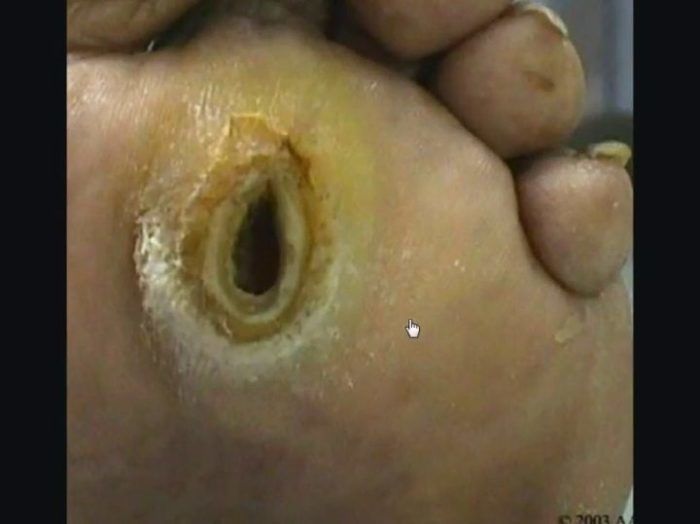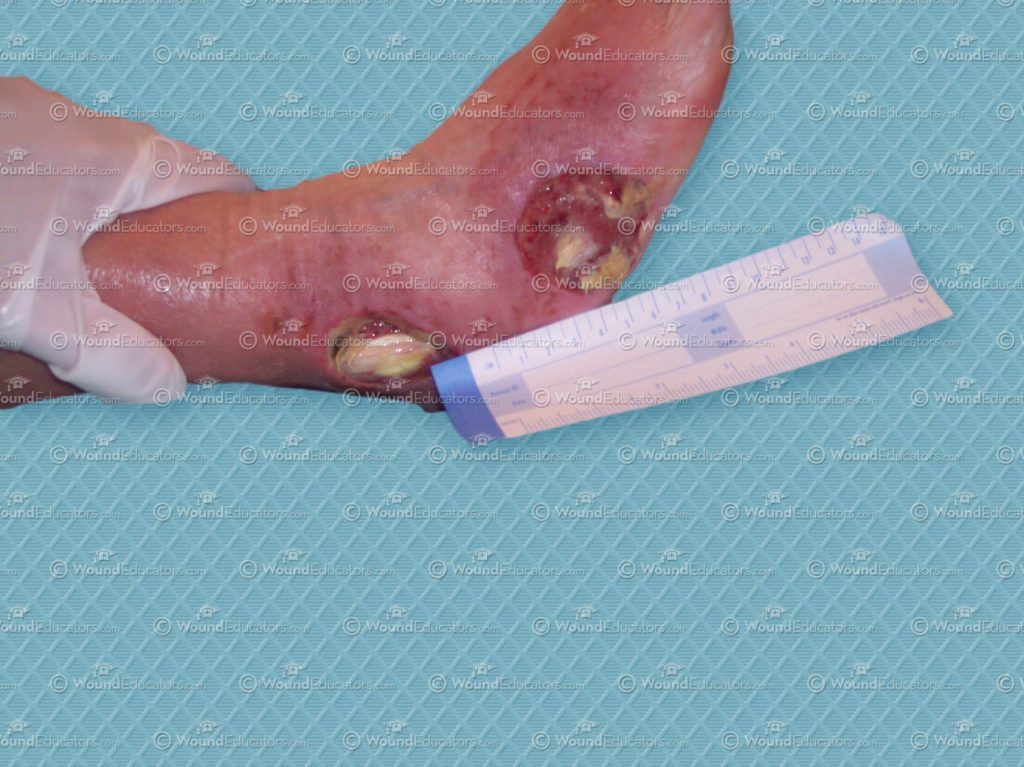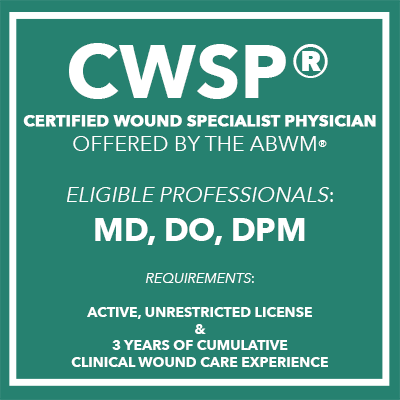Wound Care Certification for Podiatrists
Almost all podiatrists have received basic wound care training. Contrarily, few podiatrists have achieved full wound care certification. Throughout their career, Podiatrists will see many patients affected by chronic wounds. Having the right wound care education will help podiatrists better diagnose and treat these wounds. Podiatrist wound care certification begins by building on the general wound knowledge previously learned and expanding on it. Full certification provides in-depth wound training and proof of skill mastery.
The Importance of Wound Certification for Podiatrists
Podiatrists, by nature, may be the first to diagnose wounds due to common wound location. There are many wounds that surface on the feet first. These wounds can be caused by lack of blood flow, nerve damage, or simple injury from daily activities.
Next, let’s look at the statistics. Diabetes is on the rise. According to the CDC, there are 30 million adult Americans who currently live with diabetes. This number has tripled in the last 20 years. [1]

How does this diabetes information relate to wound certification for Podiatrists? Diabetes is a leading cause of many chronic wounds – notoriously, diabetic foot ulcers.
Many people with diabetes have damaged nerves in their legs and feet, preventing them from feeling pain, heat or cold. This can lead to injuries otherwise prevented. Compromised blood flow and lack of circulation can only make these foot problems worse. Diabetic foot ulcers can be very hard to treat because of their common reoccurrence. Often, diabetic foot ulcers lead to amputation. A diabetic amputation happens every 20 seconds. 75% of lower-extremity amputations are traced back to diabetes. [1]
Become the Wound Care Specialist
Another reason podiatrists should seek accredited wound care certification is to create a specialty. Instead of referring patients to a wound care specialists, podiatrists can become one! Wound care certification for podiatrists can result in getting more patients and creating a more successful business. Unfortunately for patients, but fortunately for providers, chronic wounds often lead to multiple appointments. For example, diabetic foot ulcers may take up to 20 weeks to heal, if they heal at all.
Improving Patient Outcomes

When podiatrists are better prepared to treat chronic wounds, including diabetic foot ulcers, this can result in fewer amputations. Diabetic foot ulcers progress rapidly, and the more prepared a podiatrist is to treat such wounds, the better the patient outcome is. Catching diabetic foot ulcers early is key. Wound care certification helps podiatrists accurately spot the difference between infection and inflammation, and the difference between a foot ulcer and a blister.
Create More Value for Patients
Podiatrists who seek wound care certification automatically create more value for their patients. Showing a commitment to patient success through continuing education and certification has unlimited benefits. Podiatrists who seek wound care certification automatically become a source patients can trust. Wound care certification will not only teach podiatrists wound care management but also patient strategies. Proper patient nutrition and at-home continued care increase success rates. Both topics are discussed at an in-depth level in our wound care certification for podiatrists course.
Wound Certified Teresa Connor-Kerr states, “We owe it to our patients to be able to demonstrate our competence. This advanced credential shows that you are an advanced practitioner.”
Online Wound Care Certification Course for Podiatrists
Podiatrists who wish to become wound care certified can start by taking our wound care certification course. Our courses are 100% online, allowing podiatrists to study when and where they can.
Specialty topics Podiatrists will learn through our wound care certification course include: DFU (Diabetic Foot Ulcers), Neuropathy, Osteomyelitis, PAD (
Important wound management and treatment techniques Podiatrists will learn through our wound care certification course include:
- Appropriate Wound Dressings for Feet
- Proper Footwear for Pressure Displacement
- Debridement
- NPWT (Negative Pressure Wound Therapy)
- HBOT (Hyperbaric Oxygen Therapy)
- Moist Wound Healing
- Skin Grafts
- Proper nutrition
Accredited Wound Care Certification for Podiatrists

After taking our wound care course, Podiatrists will be prepared for the wound care certification exam of their choice. It is important for podiatrists to choose an accredited certification. One of the most elite wound care certifications for Podiatrists is the CWSP® Certified Wound Specialist Physician. This wound certification is offered by the ABWM to MDs, DOs, and DPMs only.
The healthcare field needs more wound care certified podiatrists, especially with the increasing prevalence of diabetes. Podiatrists can have confidence managing complex cases after pursuing wound care certification. Podiatrists can user wound certification to create their specialty and help improve patient success rates.
1. March 14, 2018. Diagnosed Diabetes, National and State Data. National Center for Chronic Disease Prevention and Health Promotion, Division of Diabetes Translation. CDC.gov.

Please could you advise how I can join this course. I am a Podiatrist and also a qualified Nurse.
Kind regards
Claire
Claire,
We recommend taking the Physician course – all courses are 100% online, so you can register any time. These courses are self-paced, so you can complete wound care certification prep on your own schedule!
I am a Podiatry Health Technician, working in a Podiatry office. I’ve been doing wound care for 3 yrs and would like to know if I am can take this course and become a certified in Podiatry Wound Care .
Thayla, you can always take our Basic wound care course and apply to take the CWCA exam. The CWCA is offered by the ABWM. https://woundeducators.com/compare-wound-care-certifications/
I’m a physicion but I don’t have a license to practice medicine in USA
I just moved to the states and in need to work
Can I work with this certificate in TX?
Shereen,
In order to practice medicine in the US, you must have an active license. If you are interested in wound care certification, you can use our courses to prepare for the wound certification of your choice. To register to take most wound care exams, you must also show proof of active licensure.
I am interested in Wound Care Certification Podiatry
Hi Jeff, we have quite a few podiatrists that use our physician course to learn more about wound care and prepare for wound certification. The course can be found here – Physician Wound Care Certification Course
after completing the course, can a DPM care for wounds outside of lower extremities, or does their license restrict them to LE only
after completing the course, can a DPM care for wounds outside of lower extremities, or does their license restrict them to LE only